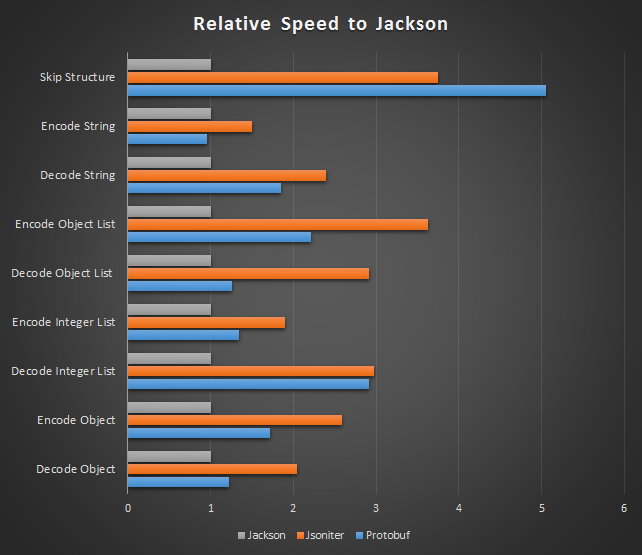| layout | title |
|---|---|
default |
Fastest JSON parser ever |
jsoniter (json-iterator) is fast and flexible JSON parser available in Java and Go. Good deal of the code is ported from dsljson, and jsonparser.
Traditional JSON parsers are slow. Jsoniter Java version could be 3x times faster than jackson/gson/fastjson. If you are doing a lot of log processing or number crunching, but stuck with JSON, you definitely need to consider dsl-json or Jsoniter to save the encoding/decoding cost. Is protobuf 5x faster than JSON?, part II
Jsoniter Golang version could be more than 6x times faster than standard lib (encoding/json). And the number is acheived with runtime reflection instead of go generate.
For more complete report you can checkout the full benchmark with in-depth optimization to back the numbers up
Jsoniter gets things done, as fast as possible. Most common use case is just one line:
JsonStream.serialize(new int[]{1,2,3}); // from object to JSONJsonIterator.deserialize("[1,2,3]", int[].class); // from JSON to object, with class specifiedThis is what a mediocre parser can do. Jsoniter is born from real-world anger to solve the impedance mismatch between JSON the Java language. To understand what kind of unique experience Jsoniter can provide, let's compare with existing parser api.
According to your past experience, you must know the following code will be very slow and cumbersome:
Map<String, Object> obj = deserialize(input);
Object firstItem = ((List<Object>)obj.get("items")).get(0);To get the best performance and concise compact code, you'd better define a class as the data schema:
public class Order {
public List<OrderEntry> items;
}
Order order = deserialize(input, Order.class);
OrderEntry firstItem = obj.items.get(0);This is a good practice when you are doing very formal business logic. But what if you just want to get a string from a deeply nested structure, will you have the patience to define the data schema of each level? Cut the crap, please! Most data extraction can be done in one line:
Jsoniter.deserialize(input).get("items", 0); // the first itemThe return type of deserialize is "Any", very similiar to the idea of using Map<String, Object>, to represent Any data without defining the class. Unlike Map<String, Object>, it has a fluent api:
Any any = Jsoniter.deserialize(input); // deserialize returns "Any", actual parsing is done lazily
any.get("items", '*', "name", 0); // extract out the first name from all items
any.get("size").toLong(); // no matter it is "100" or 100, return it as long, making Java weakly typed
any.bindTo(Order.class); // binding the JSON into object
for (Any element : any) {} // iterate the collection, Any implements iterableBest of all, the schema-less experience is backed by lazy parsing technology. Anything not read, will be kept in JSON form as it is. The performance of Any will be much faster than using Map<String, Object>. Now, in Java, you can parse the JSON like Javascript or PHP. JSON is fun with any.
Jsoniter will not only be the fastest parser in runtime, but also trying very hard to be the fastest parser to help you getting your job done.
- Golang version is drop-in replacement for standard library (encoding/json),
json.Marshalorjson.Unmarshaljust replace json with jsoniter. - Support gson compatibility mode
- Support jackson compatibility mode (coming soon)
Jsoniter has more than enough feature, with an example driven style document. You can see a lot of code snippet to demonstrate various common task:
- How to use in Android platform with static code generation
- How to check if property is present in JSON
- How to customize encoding/decoding
- Many more...
Tutorial on sitepoint: https://www.sitepoint.com/php-style-json-parsing-in-java-with-jsoniter/
Introduction on dzone: https://dzone.com/articles/is-protobuf-5x-faster-than-json
For Java version
<dependency>
<groupId>com.jsoniter</groupId>
<artifactId>jsoniter</artifactId>
<version>0.9.19</version>
</dependency>
For Go version
go get github.com/json-iterator/go
Report issue or pull request, or email [email protected], or


